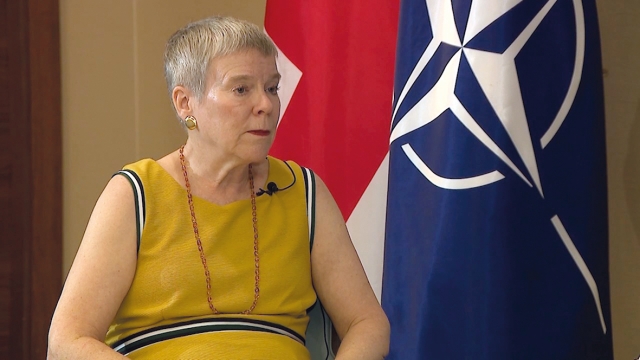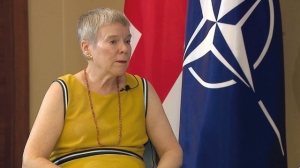Rose Gottemoeller on Georgia Keeping Its Eye on the NATO Prize
Interview
What to expect from the fast-approaching London Summit, how NATO is to assist Georgia in enhancing Black Sea security and why the higher-ups at Brussels not so keen on the so-called “Rasmussen formula”, according to which Georgia could become a member of the Alliance without Article 5, that of collective defense and security, covering the occupied territories temporarily. All these questions GEORGIA TODAY and the Georgian Institute for Security Policy (GiSP) posed to the NATO Deputy Secretary General, Rose Gottemoller, during the recent visit of the North Atlantic Council to Batumi.
What can Georgia expect from the London Summit? It seems unlikely it will receive that cherished MAP and there’s already a ‘substantial Package.’
Well, let me stress that the London meeting is not a summit meeting, so there won't be any partners there. I've been urging Georgia to think about our NATO Engagers event, an event that will take place during the London summit - a public event that will allow Georgia to really speak about how far it has come on the path of Euro-Atlantic integration and to really make a strong public case. But I do want to stress for your audience that it is not a summit meeting, so there won't be any partners present there at all. That said, we've had a lot of success with the substantial NATO-Georgia package and now I think we're at a place where Georgia is moving from being in a kind of mentorship relationship with NATO, where NATO is the mentor and Georgia is paying attention, to a more equal partnership where Georgia has actually been providing increasing security in the NATO context for many years; you've already been a very strong supporter of our resolute support mission in Afghanistan and the ISAF mission before that. Georgia has been a really strong partner in so many ways and now I think we need to focus on building up that partnership and really looking at what you need for your security and then how we can interact in a way to provide it.
Is there already an understanding of what’s needed?
We are here in Batumi to visit Georgia’s Coast Guard vessels and the crews who have been trained with NATO help. I see recognition that Black Sea security is going to be an important priority area to move forward on and there are other areas that we can continue on the path, the Joint Training and Evaluation Center (JTEC) being a great example of something NATO was very happy with this year when the NATO Georgia exercise took place in March. Georgia is really pulling its own weight now and so we want to continue to work with you on more and more sophisticated exercise activities and really be able to use the JTEC to its full potential. What NATO needs, and I think it’s a big something, is a sea change, which is very important for Georgia. Some of the threats coming at us every day, like the cyber threats, hybrid threats, are something that sadly Georgia has a great deal of experience with. This is another direction of the potential symbiotic relationship we can continue, seeing NATO helping Georgia to address these threats and it helping us to understand them.
Regarding Black Sea security, Georgia is a country that cannot boast of any substantial fleet. How important a role can it feasibly play?
I'm a great admirer of the Coast Guard, the US Coast Guard, any Coast Guard, because they are right at the center of border security from the sea side, from the ocean side, for their nations. What the Georgian Coast Guard is doing is extraordinarily important. Obviously, you are a Black Sea littoral state, so it's most important to protect your shores from the security challenges that can come at you, whether they're from a country such as Russia promulgating or whether you have another problem to deal with such as illegal smuggling. It's very important that your borders be defended and the Coast Guard provides for that.
And that NATO invest more efforts in building resilience.
Not only in building resilience, though that is certainly part of it, but also in building capacity; in making sure you have the maritime situational awareness capability and making sure there's a constantly good flow of information. One of the things we're doing is working on better sharing of information, including intelligence sharing. All of these things will be important when continuing to develop Georgia's capacity and are mutually beneficial and good for NATO as well.
Would it be wishful thinking to hope this will translate into some sort of technical defensive capacity?
It is important to always focus on deterrence and defense, and that means having the capability, capacity and training to deter any possible aggressor. This is something that every country works on every day: enhancing their deterrence and defense capacity, and Georgia is no different in that regard.
What importance could the Anaklia Deep Sea Port play from NATO’s perspective?
I have been hearing quite a bit about the Anaklia Port since I've been here, and I had read about it in the press. I'll say that NATO is interested in ensuring economic health for the countries in the region; it makes for better security if a country is enjoying economic benefits from trade and economic relationships to the degree which a new port here in Georgia will help create. I think it will be good for Georgia's economic health and in the end your security and stability.
What did you think of Former Secretary General Rasmussen’s renowned statement? Is it a feasible scenario? Has there been any discussion about it in NATO?
There has not been any discussion in NATO about it, and one message I'd like to stress is in terms of discussion and debate among any NATO allied member country or among our partners: it's really up to you what you want to discuss but I think from our perspective we really want to focus with our allies on Georgia being an aspiring NATO member; to focus on what needs to be done keep our eye on the prize. That's why we want to focus on what Georgia needs to do to acquire NATO membership and that means continuing to work on your reform processes, political reforms, reforms in the defense establishment and continuing to work with NATO allies. We believe it's important to keep your eye on what will help you move toward NATO membership.
If we were to say ‘yes we want [Rasmussen’s option],’ would NATO be eager to discuss it?
Well let me put it this way, I think it's up to you to discuss and debate any matter and of course you know we're willing to listen to your conclusions, but the important thing for Georgia over time is to develop consensus among NATO members about embracing Georgia as a full member of NATO; so what you need to do is focus on building up Georgia's capability and capacity for deterrence and defense and on being a security provider; to me that is the prize you need to keep your eye on.
By Vazha Tavberidze












